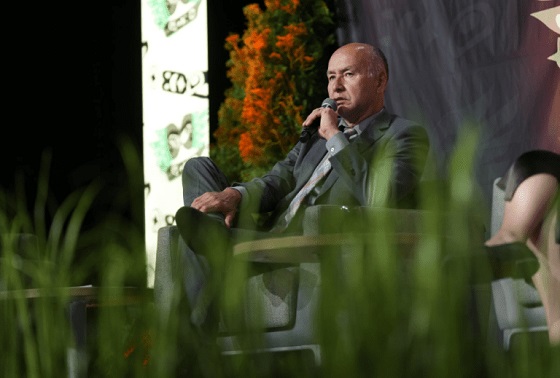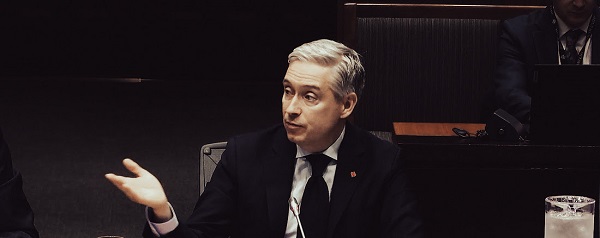Business
Canada’s economic pain could be a blessing in disguise

This article supplied by Troy Media.
 By Roslyn Kunin
By Roslyn Kunin
Tariffs, inflation, and falling incomes sound bad, but what if they’re forcing us to finally fix what’s broken?
Canada is facing serious economic headwinds—from falling incomes to rising inflation and U.S. trade hostility—but within this turmoil lies an opportunity. If we respond wisely, this crisis could become a turning point, forcing long-overdue reforms and helping us build a stronger, more independent economy.
Rather than reacting out of frustration, we can use these challenges to reassess what’s holding us back and move forward with practical solutions. From
trade policy to labour shortages and energy development, there are encouraging shifts already underway if we stay focused.
A key principle when under pressure is not to make things worse for ourselves. U.S. tariffs on Canadian steel and aluminum, and the chaotic renegotiation of NAFTA/CUSMA, certainly hurt our trade-dependent economy. But retaliatory tariffs don’t work in our favour. Canadian imports make
up a tiny fraction of the U.S. economy, so countermeasures barely register there, while Canadian consumers end up paying more. The federal government’s own countertariffs on items like orange juice and whisky raised costs here without changing American policy.
Fortunately, more Canadians are starting to realize this. Some provinces have reversed bans on U.S. goods. Saskatchewan, for example, recently lifted
restrictions on American alcohol. These decisions reflect a growing recognition that retaliating out of pride often means punishing ourselves.
More constructively, Canada is finally doing what should have happened long ago: diversifying trade. We’ve put too many economic eggs in one
basket, relying on an unpredictable U.S. market. Now, governments and businesses are looking for buyers elsewhere, an essential step toward greater stability.
At the same time, we’re starting to confront domestic barriers that have held us back. For years, it’s been easier for Canadian businesses to trade with the U.S. than to ship goods across provincial borders. These outdated restrictions—whether on wine, trucks or energy—have fractured our internal market. Now, federal and provincial governments are finally taking steps to create a unified national economy.
Labour shortages are another constraint limiting growth. Many Canadian businesses can’t find the skilled workers they need. But here, too, global shifts
are opening doors. The U.S.’s harsh immigration and research policies are pushing talent elsewhere, and Canada is emerging as the preferred alternative.
Scientists, engineers and graduate students, especially in tech and clean energy, are increasingly choosing Canada over the U.S. due to visa uncertainty and political instability. Our universities are already benefiting. If we continue to welcome international students and skilled professionals, we’ll gain a long-term advantage.
Just as global talent is rethinking where to invest their future, Canada has a chance to reassert leadership in one of its foundational industries: energy.
The federal government is now adopting a more balanced climate policy, shifting away from blanket opposition to carbon-based energy and focusing instead on practical innovation. Technologies such as carbon capture and storage are reducing emissions and helping clean up so-called dirty oil. These cleaner energy products are in demand globally.
To seize that opportunity, we need infrastructure: pipelines, refining capacity and delivery systems to get Canadian energy to world markets and across our own country. Projects like the Trans Mountain pipeline expansion, along with east-west grid connections and expanded refining, are critical to reducing dependence on U.S. imports and unlocking Canada’s full potential.
Perhaps the most crucial silver lining of all is a renewed awareness of the value of this country. As we approach July 1, more Canadians are recognizing how fortunate we are. Watching the fragility of democracy in the U.S., and confronting the uncomfortable idea of being reduced to a 51st state, has reminded us that Canada matters. Not just to us, but to the world.
Dr. Roslyn Kunin is a respected Canadian economist known for her extensive work in economic forecasting, public policy, and labour market analysis. She has held various prominent roles, including serving as the regional director for the federal government’s Department of Employment and Immigration in British Columbia and Yukon and as an adjunct professor at the University of British Columbia. Dr. Kunin is also recognized for her contributions to economic development, particularly in Western Canada.
Troy Media empowers Canadian community news outlets by providing independent, insightful analysis and commentary. Our mission is to support local media in helping Canadians stay informed and engaged by delivering reliable content that strengthens community connections and deepens understanding across the country.
Business
The Grocery Greed Myth

Haultain’s Substack is a reader-supported publication.
To receive new posts and support our work, please consider becoming a free or paid subscriber.
Try it out.
The Justin Trudeau and Jagmeet Singh charges of “greedflation” collapses under scrutiny.
“It’s not okay that our biggest grocery stores are making record profits while Canadians are struggling to put food on the table.” —PM Justin Trudeau, September 13, 2023.
A couple of days after the above statement, the then-prime minister and his government continued a campaign to blame rising food prices on grocery retailers.
The line Justin Trudeau delivered in September 2023, triggered a week of political theatre. It also handed his innovation minister, François-Philippe Champagne, a ready-made role: defender of the common shopper against supposed corporate greed. The grocery price problem would be fixed by Thanksgiving that year. That was two years ago. Remember the promise?
But as Ian Madsen of the Frontier Centre for Public Policy has shown, the numbers tell a different story. Canada’s major grocers have not been posting “record profits.” They have been inching forward in a highly competitive, capital-intensive sector. Madsen’s analysis of industry profit margins shows this clearly.
Take Loblaw. Its EBITDA margin (earnings before interest, taxes, depreciation, and amortization) averaged 11.2 per cent over the three years ending 2024. That is up slightly from 10 per cent pre-COVID. Empire grew from 3.9 to 7.6 per cent. Metro went from 7.6 to 9.6. These are steady trends, not windfalls. As Madsen rightly points out, margins like these often reflect consolidation, automation, and long-term investment.
Meanwhile, inflation tells its own story. From March 2020 to March 2024, Canada’s money supply rose by 36 per cent. Consumer prices climbed about 20 per cent in the same window. That disparity suggests grocers helped absorb inflationary pressure rather than drive it. The Justin Trudeau and Jagmeet Singh charges of “greedflation” collapses under scrutiny.
Yet Ottawa pressed ahead with its chosen solution: the Grocery Code of Conduct. It was crafted in the wake of pandemic disruptions and billed as a tool for fairness. In practice, it is a voluntary framework with no enforcement and no teeth. The dispute resolution process will not function until 2026. Key terms remain undefined. Suppliers are told they can expect “reasonable substantiation” for sudden changes in demand. They are not told what that means. But food inflation remains.
This ambiguity helps no one. Large suppliers will continue to settle matters privately. Small ones, facing the threat of lost shelf space, may feel forced to absorb losses quietly. As Madsen observes, the Code is unlikely to change much for those it claims to protect.
What it does serve is a narrative. It lets the government appear responsive while avoiding accountability. It shifts attention away from the structural causes of price increases: central bank expansion, regulatory overload, and federal spending. Instead of owning the crisis, the state points to a scapegoat.
This method is not new. The Trudeau government, of which Carney’s is a continuation, has always shown a tendency to favour symbolism over substance. Its approach to identity politics follows the same pattern. Policies are announced with fanfare, dissent is painted as bigotry, and inconvenient facts are set aside.
The Grocery Code fits this model. It is not a policy grounded in need or economic logic. It is a ritual. It gives the illusion of action. It casts grocers as villains. It gives the impression to the uncaring public that the government is “providing solutions,” and that “it has their backs.” It flatters the state.
Madsen’s work cuts through that illusion. It reminds us that grocery margins are modest, inflation was monetary, and the public is being sold a story.
Canadians deserve better than fables, but they keep voting for the same folks. They don’t think to think that they deserve a government that governs within its limits; a government that accept its role in the crises it helped cause, and restores the conditions for genuine economic freedom. The Grocery Code is not a step in that direction. It was always a distraction, wrapped in a moral pose.
And like most moral poses in Ottawa, it leaves the facts behind.
Haultain’s Substack is a reader-supported publication.
To receive new posts and support our work, please consider becoming a free or paid subscriber.
Try it out.
Business
Tax filing announcement shows consultation was a sham

The Canadian Taxpayers Federation is criticizing Prime Minister Mark Carney for announcing that the government is expanding automatic tax filing within hours of the government’s consultation ending.
“There’s no way government bureaucrats pulled an all-nighter reading through thousands of submissions and survey responses before sending Carney out to make an announcement on automatic tax filing the next morning,” said Franco Terrazzano, CTF Federal Director. “Asking Canadians for their opinion and then ignoring them isn’t a good look for Carney, it makes it look like the government is holding sham consultations.”
The government of Canada announced consultations on automatic tax filing so Canadians could give the government “broad input through an online questionnaire.”
The government’s consultation ended on Thursday, Oct. 9, 2025.
Hours after the consultation ended, Carney today announced the government would expand automatic tax filing.
The CRA is already one of the largest arms of the federal government with 52,499 bureaucrats.
The CRA added 13,015 employees since 2016 – a 33 per cent increase. For comparison, America’s Internal Revenue Service has 90,516 bureaucrats. The CRA has one bureaucrat for every 800 Canadians. The IRS has one bureaucrat for every 3,800 Americans.
“The CRA can barely answer the phone, so Carney shouldn’t be giving those bureaucrats more busy work to do,” Terrazzano said. “The CRA is a bloated mess, and Carney should be cutting the cost of bureaucracy not scheming up ways to give the bureaucracy more power over taxpayers.”
The CRA only answered about 36 per cent of the 53.5 million calls it received between March 2016 and March 2017, according to a 2017 Auditor General report. When Canadians were able to get the CRA on the phone, call centre agents gave inaccurate information about 30 per cent of the time.
“The CRA acting as both tax collector and tax filer is a serious conflict of interest,” Terrazzano said. “Trusting the taxman to do your tax return is like trusting your dog to protect your burger.
“Carney should stop the CRA power grab and instead cut taxes and simplify the tax code.”
-

 Alberta1 day ago
Alberta1 day agoFact, fiction, and the pipeline that’s paying Canada’s rent
-

 Energy2 days ago
Energy2 days agoIn the halls of Parliament, Ellis Ross may be the most high-profile advocate of Indigenous-led development in Canada.
-

 Energy2 days ago
Energy2 days ago“It is intellectually dishonest not to acknowledge the … erosion of trust among global customers in Canada’s ability to deliver another oil pipeline.”
-

 Aristotle Foundation2 days ago
Aristotle Foundation2 days agoEfforts to halt Harry Potter event expose the absurdity of trans activism
-

 International19 hours ago
International19 hours agoTrump gets an honourable mention: Nobel winner dedicates peace prize to Trump
-

 Business10 hours ago
Business10 hours agoCarney government plans to muddy the fiscal waters in upcoming budget
-

 Bruce Dowbiggin2 days ago
Bruce Dowbiggin2 days agoCanada’s Humility Gene: Connor Skates But Truckers Get Buried
-

 International1 day ago
International1 day agoTrump-brokered Gaza peace agreement enters first phase







